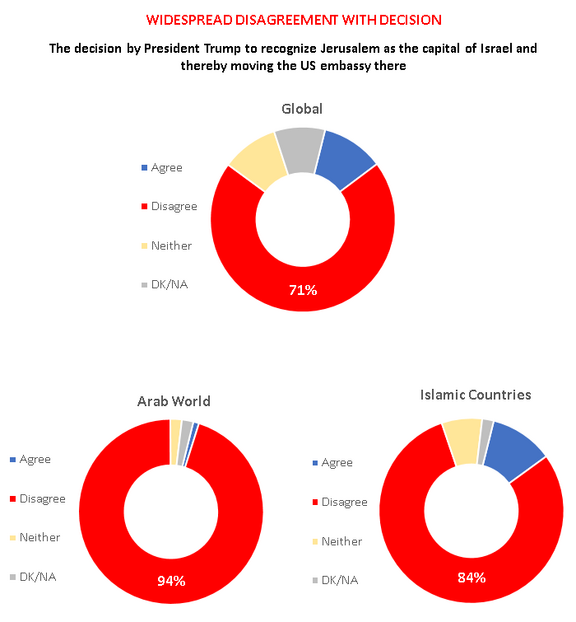Widespread disagreement with the US President’s decision to recognize Jerusalem as the capital of Israel
There is global disapproval of President Trump’s decision to recognize Jerusalem as the capital of Israel. More than two in three (71%) disagree with the proposal (59%strongly). In the Arab world alone disagreement stands at 94%. Traditional allies in Jordan (97%), South Korea (46%) and the UK (45%) all disagree with the proposal.
But worryingly a majority (52%) say that it gives the Palestinians more justification to use violence to achieve their own state. In an already volatile Arab world this figure increases to 77%. As a result, more than two in three (70%) of those polled around the world think the decision will result in an increase in terrorism in the Islamic World. The number increases significantly in Yemen (87%), Syria (82%) and Iraq (76%) – the same countries currently fighting violent extremist organisations at home.
The appetite and belief that peace was achievable between Palestinians and Israelis was always brittle as best. However, the poll also suggests this has made it a lot harder to achieve now.
Key Findings
Kancho Stoychev, President of Gallup International Association (GIA) said:
“It’s rare for an opinion survey to register such unanimity on a single issue which indicates a deep pain among the Muslim world from the Middle East to Far Asia. But the overall reaction to the Trump decision is also predominantly negative in Europe. It seems that decades of trust in the balancing role of US diplomacy are evaporating.”
Methodology
Sample Size and Mode of Field Work
A total of 22,105 persons were interviewed in 24 countries. In each country a representative sample of men and women was interviewed either face to face (9 countries, n=8,187), via telephone (11 countries, n=8,805) or online (4 countries, n=5,113). The field work was conducted during December 2017-January 2018.

